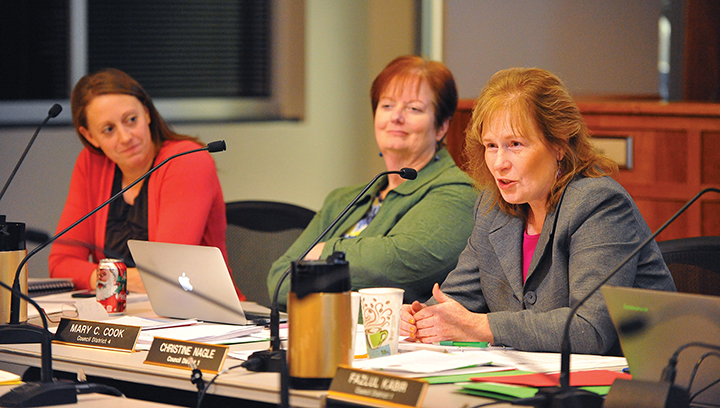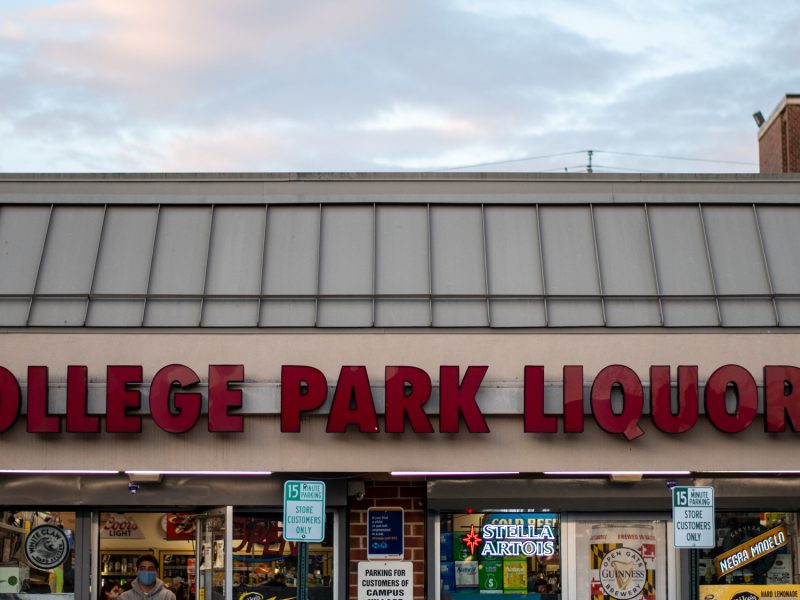After weeks of debate, the College Park City Council is one step closer to approving its budget for fiscal year 2017.
Total operating revenues, or income from day-to-day operations, rose by almost 10 percent since fiscal year 2016, according to the budget, which has more than $17.8 million in operating revenues and includes no increases in taxes, fees or fines.
Scott Somers, the city manager, said the proposed budget “reflects the city’s commitment to providing valuable government services to the community at large in a cost-effective and efficient manner.”
After the budget process began in January 2016, Somers asked local departments to eliminate unnecessary spending. By the end of March 2016 the council received the proposed budget and discussed it throughout several weeks in April before hearing public opinions at a budget town hall on April 29.
The council’s comments during the budget worksession led to several changes to the proposed budget, including using $26,000 to buy and install two, instead of one, rectangular rapid flashing beacons to serve as a user-activated light for pedestrians and bikers at crossings without stop signs or lights. These beacons will likely go on Rhode Island Avenue and Metzerott Road, District 1 Councilman Fazlul Kabir said, but locations have not been officially decided.
“Rhode Island Avenue is where we started this,” District 1 Councilwoman Christine Nagle said during the council’s budget worksession April 16. “I don’t think it should take a lot of analysis for that [beacon installation] to happen.”
The budget also allocated $5,000 for two additional streetlights, according to city documents. However, the council has not yet determined the locations for these additions.
Another part of the budget will be geared toward improving the city’s aesthetic appeal, setting aside $8,000 to add trees, shrubs and flowers to its landscape, according to city documents.
“We’re trying to make College Park more inviting to others,” Kabir said. “Visitors, students, families – we want them to have a good experience.”
The goal of attracting and maintaining residents in College Park fits into the College Park City-University Partnership’s objectives. In efforts to achieve this goal, Eric Olson, executive director of the partnership, requested the city to add $50,000, on top of the $125,000 that is already allocated, to CPCUP’s budget for its home ownership grant program; this program helps employees of the university get a $15,000 down payment or closing cost assistance if they buy a house in College Park, according to the CPCUP website.
“It would be both symbolically valuable, in that we would be matching the university’s contribution, and practically valuable,” District 3 Councilwoman Stephanie Stullich said. “It would enable us to continue a program that has been successful in helping to attract new homeowners who are Maryland faculty and staff to our city.”
This funding proposal ended in a 4-4 tie, and with Mayor Patrick Wojahn absent and unable to break this tie, the council failed to get a majority to support adding this to the budget.
“I really feel like we might be paying $125,000 for staff to go attend Purple Line meetings and do other things and do sustainability things that are being done elsewhere,” Nagle said. “So if we can’t ask them to utilize [the money] for things that aren’t being done elsewhere, then I guess I’m going to say I’m not going to support it.”
While there are no major changes in expenditures for fiscal 2016 budget, income tax revenue is estimated to rise almost 4 percent, according to the requested budget. Revenue from fines and fees will also increase, as speeding trends point to an increase of about $315,000 from speed enforcement cameras.
In other nearby areas such as Greenbelt and New Carrollton, revenue from speed enforcement cameras helps to fund local police departments, Kabir said, and while this is not the case in College Park, there have been talks of establishing a city police force.
As a result, the city plans to fund a police services evaluation and feasibility study to determine whether a local police department is necessary, Kabir said.
“When you have your own force, there’s better accountability and officers are in better touch with residents,” Kabir said. “The issue is the cost, [and] are we ready to support one.”
Not many residents showed up at the budget town hall on April 29, Kabir said, and the city will try to conduct a survey to hear more residents’ opinions.
“Either we’re doing a really good job, or we’re not doing very good,” he said. “People either like what we’re doing and had other things to do, or they feel disenfranchised and thought it was a waste of time.”
A public hearing on the budget is scheduled for May 10 at City Hall, and the final council vote for the budget will be held May 24. The budget is set to go into effect on July 1.



